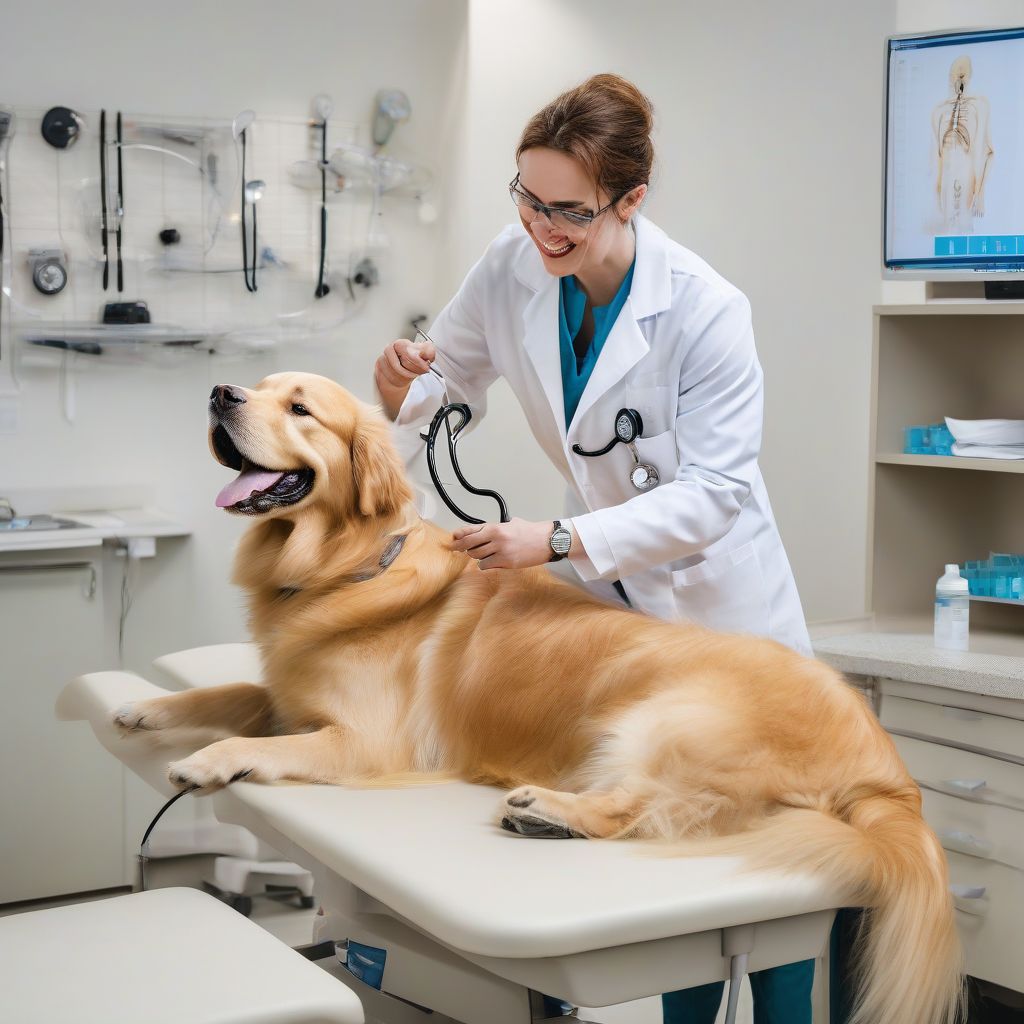“A healthy pet is a happy pet.” This simple statement holds a world of truth. Just like humans, our beloved pets need regular medical check-ups to ensure they live long, healthy lives by our side. But what exactly happens during a pet health check-up, and how often should you schedule them? Let’s dive into the world of preventative pet care and explore the importance of these crucial vet visits.
Understanding Pet Health Check-ups: More Than Just Vaccines
You might think pet health check-ups are only about vaccinations, but they’re much more than that. These appointments are a comprehensive assessment of your furry friend’s overall health and well-being. They provide a valuable opportunity for your vet to detect potential issues early on, when they’re easier and less costly to treat.
What to Expect During a Check-up:
During a routine check-up, your veterinarian will:
- Discuss your pet’s medical history and lifestyle: This includes diet, exercise routine, behavioral changes, and any concerns you might have.
- Perform a physical examination: This involves checking your pet’s weight, temperature, heart rate, listening to their lungs, examining their eyes, ears, teeth, skin, and coat, and palpating their abdomen.
- Recommend necessary vaccinations and parasite prevention: Based on your pet’s age, lifestyle, and risk factors, the vet will advise on appropriate vaccinations and parasite control measures.
- Perform fecal exams and blood work (if needed): These tests help detect internal parasites, assess organ function, and identify any underlying health conditions.
- Address any questions or concerns you have: This is the perfect time to ask your vet about your pet’s diet, behavior, training, or any other pet-related concerns.
 Regular Pet Health Check-up
Regular Pet Health Check-up
Why are Regular Pet Health Check-ups Important?
You wouldn’t wait years to see your doctor, would you? The same principle applies to our pets. Regular check-ups are vital for the following reasons:
1. Early Detection and Prevention:
Just like with human health, prevention is better than cure. Many diseases and conditions, if caught early, can be managed more effectively and may even be curable.
2. Establishing a Baseline:
Regular check-ups establish a baseline for your pet’s health. This helps your veterinarian track changes over time and identify any abnormalities that might indicate a developing issue.
3. Addressing Concerns Promptly:
Have you noticed a change in your pet’s appetite, activity level, or bathroom habits? These subtle signs could be early indicators of a health problem. Addressing them promptly with your vet can make a significant difference in your pet’s long-term health.
4. Building a Strong Vet-Client-Patient Relationship:
Frequent visits help build trust and familiarity between your pet, you, and your veterinarian. This open communication ensures you can work together as a team to provide the best possible care for your furry friend.
How Often Should My Pet Have a Check-up?
The frequency of pet health check-ups depends on various factors, including:
- Age: Puppies and kittens need more frequent visits due to their rapid growth and development and need for vaccinations. Senior pets also benefit from more frequent check-ups as they are more prone to age-related health issues.
- Lifestyle: Pets that spend time outdoors, interact with other animals, or travel frequently might require more frequent check-ups due to increased exposure to potential health risks.
- Existing Health Conditions: Pets with pre-existing conditions like diabetes, allergies, or arthritis need closer monitoring and more frequent veterinary care.
General Guidelines:
- Puppies and Kittens (under 1 year): Monthly visits are recommended for initial vaccinations, deworming, and to monitor their development.
- Adult Pets (1-7 years): Annual check-ups are generally sufficient for healthy adult dogs and cats.
- Senior Pets (7+ years): Bi-annual check-ups are recommended to monitor for age-related conditions and ensure they receive appropriate preventative care.
Remember, these are just general guidelines. Your veterinarian can recommend the best check-up schedule tailored to your pet’s specific needs.
Making the Most of Your Pet’s Check-up
To maximize your pet’s health check-up, follow these tips:
- Prepare a list of questions or concerns: This helps ensure you remember to address everything important during your appointment.
- Bring a stool sample: This helps your vet check for intestinal parasites.
- Be honest about your pet’s diet, exercise, and lifestyle: This information is crucial for your vet to make accurate health assessments and recommendations.
- Ask about preventative measures: Discuss flea and tick prevention, heartworm medication, dental care, and other preventative measures that can help protect your pet from future health issues.
- Follow your vet’s recommendations: This includes scheduling follow-up appointments, administering medications as prescribed, and making necessary lifestyle changes to support your pet’s well-being.
Investing in Your Pet’s Health:
Regular pet health check-ups are an essential part of responsible pet ownership. They provide an opportunity for early detection and prevention of health issues, strengthen the bond between you, your pet, and your veterinarian, and ultimately contribute to a longer, healthier, and happier life for your beloved companion. Remember, a little preventative care goes a long way in ensuring your furry friend enjoys many happy and healthy years by your side.
[amazon bestseller=”pet first aid kit”]
